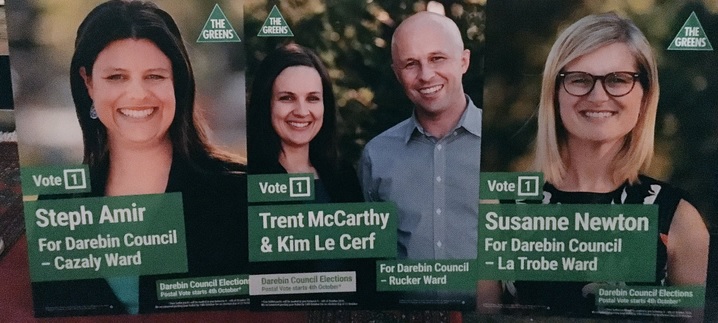This October Victorians will all receive their mail-in ballots for local council elections. Facebook ads of candidates promoting their message are starting to appear in feeds.
Truth is, most people are ambivalent and apathetic towards local council elections. Others are downright dismissive, so much so that they will preference candidates 1,2,3,4 and so on without even thinking about it.
For those who do engage, the main source of information they vote on is the candidate’s official statement. So the entire process is rather surface level apart from the few individuals who try to look elsewhere for information about each candidate.
This information is difficult to find. Candidates are required to declare if they have been endorsed by a particular political party, but often parties simply refrain from officially doing this. This means members of particular political parties are running as candidates unbeknownst to the voter.
You might be thinking this does not matter. Councils are about roads and rubbish collection, right? Is it really so different if the candidate has links to Liberal, Labor, Green or One Nation when it comes to local issues?
The answer is yes, it does matter. Often, voters are unwittingly assisting the political advancement of a party political operator whose affiliation they might normally detest. The candidate’s elevation to council serves to legitimise their political development and influence, and they often end up running in more influential contests, such as state or federal elections.
Imagine my shock when I voted for an incumbent councillor in my local ward only to see his face on a Labor party poster at the proceeding state election. I also find it interesting that former federal Labor MP Mike Symon is running for Maroondah City Council but has ticked ‘No’ to the question about official party endorsement. Odd.
What’s more is that issues such as planning approvals, town ethos, public events and local social policy can be directly influenced by the party affiliation of particular councillors. Given the current debate around fire policy and forest management, the ideological mindset of local candidates is even more relevant than ever.
Without complete transparency, local council elections serve as a convenient Trojan horse for party operatives to promote their agendas. This is particularly the case for members of the Australian Greens or Victorian Socialists, who use the cloak of anonymity to gain greater access to local planning and regulation. Voters often unwittingly elect such ideologues to council and are then shocked to learn about new diversity quotas and green tape being introduced later.
As Tony Thomas wrote in Quadrant Magazine, “it’s not hard for determined agitators to convert or elect a couple of councillors, take over the council and then redirect its spare staff, funds and powers to economy and environment wrecking green ends.”
The far left group, Victorian Socialists, are also using local councils to influence public policy by stealth. There are already a number of incumbent socialist councillors in Yarra, Darebin, and Moreland, municipal areas covering Melbourne’s inner east and north. Yet they do not declare their affiliation on their official nomination. One incumbent at Yarra City Council, Bridgid O’Brien, is a member of the Victorian Socialists but, strangely enough, is running without an official endorsement from the party.
Why do you think we now have local councils declaring a climate emergency and boycotting Australia Day celebrations?
Anyone can dress up their policy positions and make them look good on paper that voters barely scan through, but compulsory declaration of party affiliation and membership on the voting form would certainly assist people to make an informed vote. This is a necessary reform.
Citizens are increasingly paying more for rates. Permits are becoming more expensive and sometimes more arduous to attain. Issues such as environmental regulation, social policy and diversity are controversial topics that spawn myriad of views. They are often on the agenda of local councils. When I vote for a representative, I want to ensure that their values align with mine.
Alas, this time around there is little mechanism to find out much information beyond what the candidate tells us, but there are ways. Research the candidate’s name. Find out if they have run for office in other elections. If they are an incumbent councillor, check their track record. Ask other people what they know.
Granted, party affiliation should not be the only factor that informs our vote and people should be open minded when they cast their ballot, but all forms of democracy should be transparent, from federal elections to local. Next time council elections roll around, I hope to be making my choice based on much more than a glossy two paragraph spiel and a nice looking photo.

Leave a comment